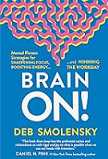Consider all the important relationships you have in your life that you likely spend precious time and energy cultivating. There’s your parents, significant other, siblings, friends, colleagues at work, and your boss. Have you considered the most important relationship you have in your life? It’s with your brain. That’s right. That beautiful organ of soft nervous tissue contained in your skull, which quietly functions as the coordinating center of all sensation and intellectual and nervous activity. Yeah, that thing.
In reading Deb Smolensky’s book, Brain ON! Mental Fitness Strategies for Sharpening Focus, Boosting Energy, and Winning the Workday, I had several “aha” and “whoa” moments learning things about my own brain I had never considered. For example, as evolved a species as we like to think ourselves to be as humans, our brains are still largely wired for fight or flight. So, when our brains get tripped up by the barrage of hourly distractions and obstacles that happen in everyday life, it gets turned “off,” which means it stops its healthy “thinking” mode and defaults to the more primal “emotional” mode. That’s when we make poor behavior choices and ill-informed decisions that can wreak havoc on ourselves, our team members, and the organization we work for. To create the conditions for flourishing in life, we need to understand how the brain works and nurture a healthy and loving relationship with it.
When you consider we only have three to four hours of prime productive brain time per day, it should snap you to attention and focus on the goals or activities you most prize (and not the myriad of tasks that otherwise dangle themselves in front of your attention). Learning to continually check in with your brain during the course of the day to ascertain how you’re feeling in terms of emotion and physical energy is essential to nurturing the relationship with your brain so it can keep you on task toward realizing the progress and contribution you most desire. When you begin feeling distracted or emotionally depleted, it may be an indication you are not working from your strengths, which is a signal to redirect your efforts better so that you can.
Tune into my conversation with Deb Smolensky and learn more about nurturing a strong, healthy, and resilient mindset. Doing so is the only way to thrive at work and to set yourself up to realize the dreams you have for your overall life. Love your brain!
Catch the conversation on iHeart or Apple, or wherever you enjoy your podcasts. Or watch the video on my Working on Purpose Radio You Tube channel.




